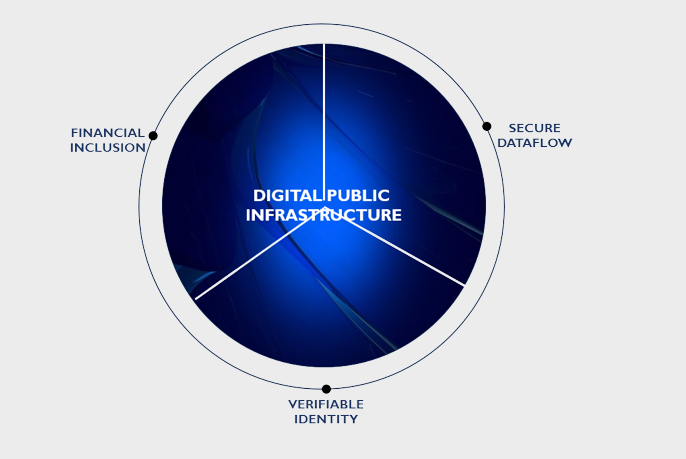Five Sutras for Building Effective Digital Public Infrastructure (DPI) (GS Paper 3, Technology)

Context:
- The concept of Digital Public Infrastructure (DPI) has gained significant attention, especially following its spotlight at the G20 summit in New Delhi, 2023.
- India’s success in achieving over 80 percent financial inclusion within a mere six years serves as a model for global digital transformation.
- As India steps up to help other nations realize digital sovereignty, financial inclusion, and self-reliance, understanding what constitutes a good DPI becomes critical.
What is a Good DPI?
- A good DPI harmonizes technology with societal needs, ensuring it is secure, scalable, and inclusive.
- It goes beyond mere technological implementation to incorporate a holistic approach that prioritizes user empowerment, privacy, and equitable access.
- The India Stack, a comprehensive digital platform, exemplifies this approach, demonstrating efficacy and security on an unprecedented scale by serving over a billion citizens.
Introducing Citizen Stack:
- The Citizen Stack emerges as a trusted regulatory body, distinct from DPI developers.
- Unlike traditional DPI providers, Citizen Stack’s role is to certify and authenticate DPIs, ensuring they meet stringent standards of quality and security.
- It sets itself apart by focusing on holistic infrastructure that prioritizes security, scalability, and inclusivity, serving as an auditor rather than a manufacturer.
Five Sutras for a Good DPI:
Uphold the Citizens’ Relationship with the Market and the State:
- A good DPI should ensure that the interaction between citizens, markets, and the state is transparent, fair, and equitable.
- It must facilitate seamless access to services and opportunities while safeguarding citizens’ rights and interests.
Safeguard Citizen Empowerment and Privacy:
- Protecting user privacy and empowering individuals are fundamental principles.
- A good DPI must implement robust measures to secure personal data, ensure consent, and provide citizens with control over their information.
Prevent Lock-In by Competing Monopolies:
- To prevent monopolistic practices, a good DPI should ensure interoperability and avoid vendor lock-in.
- It must foster a competitive environment where multiple providers can thrive, offering citizens choice and avoiding dependency on a single entity.
Techno-Legal Regulation:
- Effective DPI must integrate technology with legal frameworks to govern ethical tech use.
- This involves combining public technology and law to regulate innovation, security, and societal rights, ensuring that technological advancements align with ethical and legal standards.
Public Plus Private Innovation:
- Promoting innovation through collaboration between the public and private sectors is crucial.
- A good DPI should encourage joint ventures that harness the strengths of both sectors while ensuring that public interest prevails over corporate dominance.
-
Way Forward:
- As we advance into a digitally-driven future, adhering to these five sutras will be essential for developing and maintaining trustworthy and effective digital public infrastructures.
- Citizen Stack’s principles offer a roadmap for creating DPIs that are not only technologically advanced but also equitable and secure.
- India remains committed to enhancing digital public infrastructure for the global community, setting a standard for others to follow in the pursuit of a more inclusive digital future.


